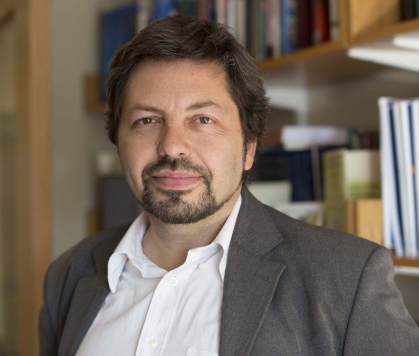Rutgers Expert Discusses Ethics of COVID-19 Vaccine Study

A team of researchers led by a Rutgers bioethics expert are arguing in a recent paper for the use of a human challenge study that they say could shave months off of a novel coronavirus vaccine timeline.
The paper, coauthored by Nir Eyal, director of the Rutgers Center for Population-Level Bioethics, Marc Lipsitch of the Center for Communicable Disease Dynamics at the Harvard T. H. Chan School of Public Health, and Peter G. Smith of the Tropical Epidemiology Group at the London School of Hygiene & Tropical Medicine, was published in March in The Journal of Infectious Diseases.
In a conventional Phase 3 trial, participants would be randomized to receive either the vaccine or control (such as a placebo) and go back to their usual living conditions, where they may or may not be exposed to the virus that causes COVID-19 disease. Researchers would follow them over time to assess whether the vaccine was effective at preventing infection.
By contrast, a human challenge study would require fewer participants than a conventional trial and would involve exposing volunteers to the virus to determine the efficacy of the vaccine.
Initially, exposing participants to a lethal virus may seem highly unethical, Eyal noted. However, with the proper trial design and processes, the net risk for participants can remain low, or even lower than it would be outside of the trial, he explained.
“The low relative risk, that is, the risk as compared to the risk that participants would be facing outside the trial, is part of what makes human challenge studies such a happy marriage of accelerated vaccine testing and ethical treatment of study participants,” said Eyal, the inaugural Henry Rutgers Professor of Bioethics at the School of Public Health and a member in residence at the Rutgers Institute for Health, Health Care Policy and Aging Research.
“And even the direct risks”, Eyal added, “remain smaller than those of live kidney donation and those of participation in clinical trials that we already find perfectly ethical, with volunteers’ informed consent.”
The evidence from a human challenge study, combined with findings from subsequent trials, could justify accelerated licensure of a vaccine, Eyal and his coauthors argued in the paper.
“It seems clear that, in the absence of an efficacious vaccine, the global death toll from COVID-19 will be enormous,” the authors wrote. “Advancing the registration and rollout of an efficacious vaccine, even by a few months, could save many thousands of lives and commands enormous societal value.”
Since the paper was published, other authors and new guidance from the World Health Organization expressed support for ethically conducted challenge trials. Nearly 25,000 people have informally volunteered online for challenge trials.
Additionally, a bipartisan congressional letter citing the paper was sent to the heads of the FDA and HHS, urging them to consider challenge trials. And there are also increasing signs that approval agencies may allow challenge trials for faster assessment of Coronavirus vaccine efficacy.
Eyal further discusses the new paper and the ethical considerations of vaccine testing during the COVID-19 pandemic:
Is a human challenge study safe, and is it ethical?
Eyal: In our paper, my coauthors and I have argued that a human challenge study could be designed to be surprisingly safe if the specific processes are followed.
The study should only involve participants who have a relatively low risk of death or severe complications from the disease -- for example, otherwise healthy people ages 20 to 45 years old who are likely to be exposed to the virus anyway because they live in high-transmission areas. A vaccine would need to be tested for safety, dosing and immune response through Phase 1 and 2 trials before a challenge study could begin.
Participants also would need to be assured that their health would be closely monitored during the study, and that they would have access to intensive care and any available medicines if and immediately when they become infected.
While safety is the primary ethical concern for a human challenge study, another is whether participants understand the risks. Voluntary informed consent is of the utmost importance. In our paper, my coauthors and I have suggested limiting participation to adults and ensuring they understand the risks and have decided, perhaps having compared the risks inside the trial to the risks outside it, or perhaps out of noble altruism, to volunteer.
Who could volunteer for a human challenge study?
Eyal: We should aim to find volunteers who have a relatively low risk of death or severe complications if they contract the disease, with a high background risk of getting infected outside the study, and who choose to participate for either medical reasons, because of the better chance of getting excellent care including any novel therapeutics that may be then be proven inside the study, or for the good of humanity—not for money.
There are risks even though we would work to reduce them as much as possible. In our paper, my coauthors and I have argued that some people are likely to volunteer because the risks from participation are uncertain but dramatically smaller than they may seem at first glance.
Why is a human challenge study appropriate in this case?
Eyal: Human challenge studies are routinely conducted for other diseases, such as seasonal flu, typhoid, and malaria. While unconventional, challenge studies are legal, and they are subject to ethical review and standards in order to ensure that the evidence is accepted and approved.
As my coauthors and I argue in our paper, we must consider unconventional approaches to address this novel coronavirus. The approach we have proposed is not without risks but has the potential to expedite candidate vaccine testing by many months.
In this current crisis, that easily could mean the difference of many thousands of lives saved.


